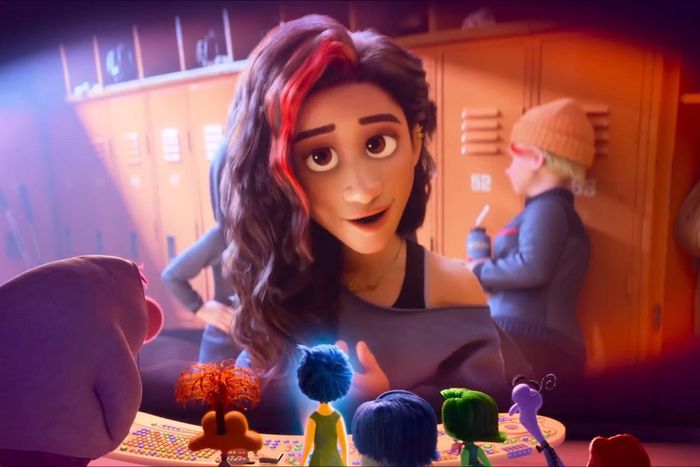
Have you ever been preemptively annoyed at something that hasn’t happened yet — only for that thing not to happen, which only leaves you more annoyed? I have, most recently around 8:35 p.m. on a weeknight during the closing credits of Inside Out 2.
To set the scene: Remember how one of the subplots of the first Inside Out was that Riley, the tween girl in whose brain much of the film takes place, was really into ice hockey? You’d better, because you are not prepared for how much ice hockey there is in Inside Out 2. Riley is now 13, in the thick of puberty and roiling with emotions. She’s attending a three-day hockey camp, where she meets her idol, a senior girl named Val who becomes the focus of Riley’s entire life. Every move she makes is in service of getting closer to Val, and hopefully getting Val to like her.
In the text of the film, this is merely because she really, really wants to be just like Val. But you don’t have to squint too hard to see a subtext where Riley is so obsessed with her beautiful, accomplished teammate because she has romantic feelings for her.
A further hint to this possibility occurs near the end of the film’s first act, after Joy, Sadness, and the rest of the emotions we know from the first Inside Out have been evicted from the mind’s control room and replaced by more complex ones, like Anxiety, Envy, and Ennui. They’re locked away in a vault, where they meet other repressed elements of Riley’s psyche. There’s her favorite character from a little kids’ cartoon, a PS2-style video game character she used to have a crush on, and also her Deep Dark Secret, which naturally takes the form of a gigantic rock monster shrouded in a tunic, too shy to reveal itself.
By this point, a discerning viewer has put the pieces together: Riley’s secret is that she’s gay. (Or she’s bi, or pansexual, or just generally queer. Happy Pride!) Except, after Joy and the gang escape from the vault, the Deep Dark Secret never appears again in the main narrative. If you’re the type of person who gets out of there as soon as the credits start to roll, Riley’s secret is a Chekhov’s gun that never goes off. Frustrating!
However, years of experience with Disney and Pixar led me to believe that the movie would not leave us hanging. These companies never let an Easter egg go un-hatched. There must be some resolution, and I was determined to see it out. Surely the question would be answered in a mid-credits interstitial? No such thing — there was a mid-credits scene, but it was just a jokey little bit about the character Ennui. Quelle surprise. But by this point I simply had to know. So I took a leap of faith, which is to say I stayed sitting as the rest of the credits rolled. My persistence paid off. After the MPA seal, there was Joy, coaxing the Deep Dark Secret to come out from the vault, which one might note is not unlike a closet. After some hemming and hawing, it finally did, upon which we learned that Riley’s secret was … she once burned a hole in a rug.
I’ll admit: A tiny, terrible part of me was prepared to roll my eyes at a gay revelation. A pointedly inclusive Pixar movie? Groundbreaking. But what we got instead is just baffling. Now, there is nothing personally at stake for me in an animated character’s sexuality one way or another. But I hate feeling like a weirdo, and this made me feel a weirdo! The film’s queer coding is so blatant that I thought we were all on the same page — only for the movie to pull the rug out and say, “Why are you even thinking about this fake tween’s possible gayness?”
The whole thing gets even more aggravating in light of the recent noise about Pixar pulling back from autobiographical stories in favor of projects with “clear mass appeal.” Is it possible that the film’s writers were indeed laying down breadcrumbs, only for even the smallest frisson of lesbianism tucked away in the furthest reaches of the credits to become verboten for a studio that’s convinced itself Too Much Identity is to blame for its recent slump?
The only silver lining? Years of experience with the Marvel Cinematic Universe using its post-credits sequences to tease movies that will almost certainly never happen tells us that the scenes are basically non-canon. So maybe there’s hope after all. Might Pixar let Inside Out 3 take place entirely at a Chappell Roan concert?


